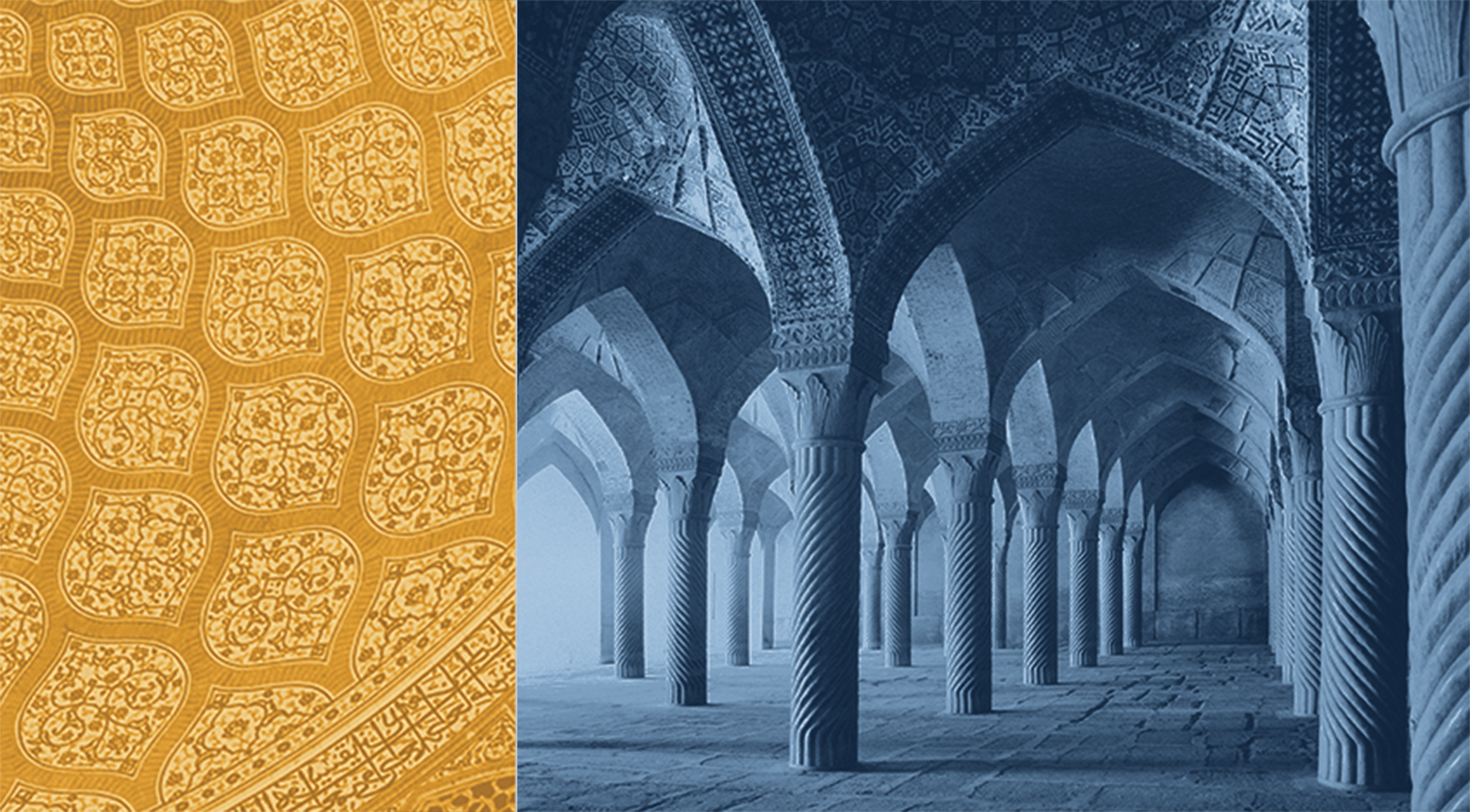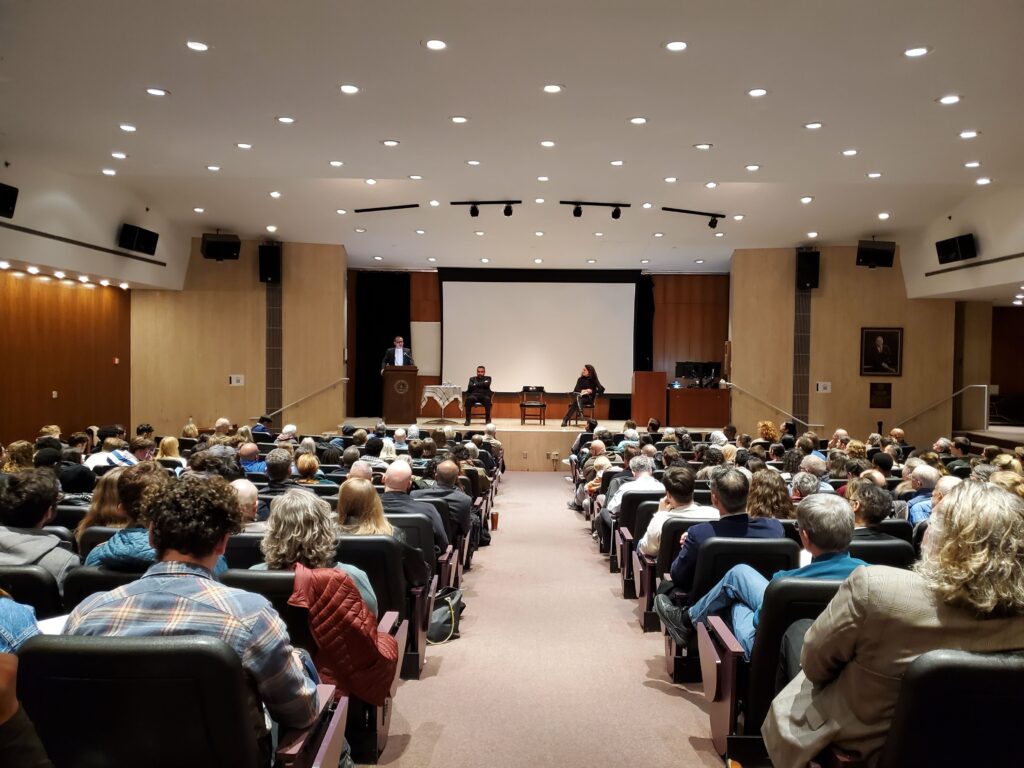
On March 25, 2025, Palestinian reverend and theologian Dr. Munther Isaac joined the broader community of the University of Notre Dame for a lecture on Christian churches’ prophetic role in the face of the genocide in Gaza and escalating processes of ethnic cleansing in the West Bank. Rev. Isaac shared reflections from his recent book, Christ in the Rubble: Faith, the Bible, and the Genocide in Gaza, and engaged with the 230-strong audience during a brief Q&A session. The audience comprised students, faculty, families with young children, local religious leaders, and people of faith from as far away as Indianapolis. The event was co-sponsored by the Contending Modernities research initiative, the Department of Theology, and the Mirza Family Chair of Islamic Thought and Muslim Societies.
“It is said of Christ that in the days of his flesh he offered up to God prayers and supplications with loud cries and tears to the one who was able to save him from death,” opened Fr. Khaled Anatolios, John A. O’Brien Professor of Theology and chair of the Department of Theology at Notre Dame. “This book [Christ in the Rubble] was written with loud cries and tears, and it strives to transform the suffering of Palestinians into prayers to God and supplications to the rest of humanity, prayers and supplications for mercy and for peace and for deliverance from the spectre of genocide.”
During the introduction to Rev. Isaac., the audience heard of the importance of learning first-hand from Palestinian voices in order to challenge dominant western narratives that obscure the system of apartheid and supremacy documented in detail by leading Israeli and international human rights organizations. Rev. Isaac, Pastor of the Evangelical Lutheran Christmas Church in Bethlehem and the Lutheran Church in Beit Sahour, and academic dean of Bethlehem Bible College, has emerged as a prophetic voice challenging Christian churches’ support of this violence and advocating for justice and peace. His Christmas sermon, “God is Under the Rubble in Gaza” drew global attention to the plight of Gazans and inspired his most recent book.
Highlights from the lecture, lightly edited for clarity, follow below.
Christian Support for Erasure
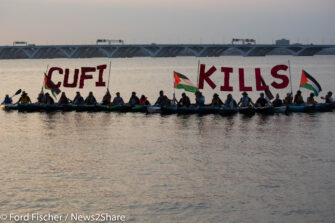
Reverend Munther expressed his deep pain and frustration at the world’s seeming tolerance and even justification of Palestinian suffering. “I am addressing existential issues for us as Palestinians . . . actually having to defend my faith and my being.” This sentiment is underscored by the Trump administration’s selection of Mike Huckabee as ambassador to Israel. Huckabee, a Baptist minister, has said, “There is really no such thing as a Palestinian,” arguing that Palestinian identity was a “political tool to try to force land away from Israel.” Rev. Isaac contended that western Christian theology has tragically played a role in enabling this genocide, mobilized by coloniality and racism. Early British Christian Zionist Lord Balfour, in fact, supported European Jewish Zionist claims to land in the colonized Ottoman Empire and historic Palestine in order to rid “Western Civilization” of “alien” Jews fleeing Russian pogroms and other violence (11).
Rev. Isaac shared his incredulity at the calls for violence and extermination of his community coming from other Christians: “At the beginning of the war some evangelical pastors celebrated, saying, maybe this will usher in the second coming of Christ . . . . One pastor called for Israel to make Gaza a parking lot within a week.” Rev. Isaac’s lecture came on the heels of a statement by one Christian Zionist group, American Christian Leaders for Israel (ACLI), to President Trump “reaffirm[ing] the Jewish people’s inalienable right to the Biblical Heartland of Israel,” which is a call for the Israeli occupation and takeover of the West Bank. The alliance between Christian Zionists and right-wing politicians in Israel at times obscures the fact that the readings of Christian theology that drive Christian Zionism are deeply antisemitic and assume Jewish conversion or damnation upon the second coming of Christ.
“Do we really have credibility as people of faith or as Christians when never again becomes yet again?” asked Rev. Isaac. “What I tried to argue in the book is that we need to judge Zionism and Christian Zionism by its fruits and its fruits today is the [Jewish] Nation State Law; its fruits today is apartheid.” The 2018 law, which was mentioned several times in the lecture, declares the “state of Israel is the nation-state of the Jewish people” and supports exclusively Jewish immigration and settlement. Its passage was hotly contested as it privileges one ethnic group above others, a hierarchy antithetical to democratic equality.
Christ in the Rubble
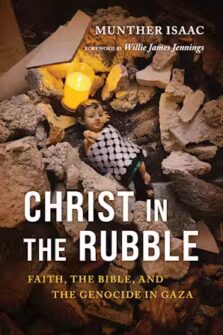
Many around the world have seen the image of baby Jesus, wrapped in a keffiyeh, cradled by chunks of concrete rubble. Rev. Isaac explained the origins of the nativity scene and his own struggle with reconciling God’s omnipotence and goodness with the existence of terrible suffering.
“The idea began when the church of St Porphyrius in Gaza was attacked and 18 people were killed including nine precious children . . . The same day the attack happened…we held an ecumenical service for a ceasefire in the Church of the Nativity in Bethlehem praying for a ceasefire and for protection. We go home and we hear about the attack and the first thing I ask myself is, does God actually care?
Two days later I had to preach, including to someone whose sister was killed in the attack and you ask yourself, what do you say? People were asking, ‘Where was God?’ ‘Why doesn’t God listen?’ People were afraid, ‘Why does he allow this?’ Back then I remember saying that I don’t have any philosophical or theological answer to that question, why would God allow suffering, other than look at at the cross and there see Jesus as the victim of the very same violence of the empire, Jesus crying at the cross: ‘My God, my God why have you forsaken me?’ To me that communicates that God actually suffers with us, is the victim of the very same violence, he is in solidarity with us. That’s when I said God is under the rubble in Gaza, he’s in the hospitals, he’s with the bereaved families. God is under the rubble in Gaza.
The Bethlehem Lutheran Church decided to do something different that year for their nativity. “We see the image of Jesus in every child pulled from under the rubble” Rev. Isaac shared. The iconic image of baby Jesus in the rubble was thus born, perhaps inspiring the Vatican’s own nativity a year later.
Solidarity
“What role should Christian theology play in confronting Christian Zionism in academic or church settings in the West?” asked an audience member. Rev. Isaac answered,
I’ll be very honest and blunt: if you ask this question you have to be ready for what I’m calling today or what we call costly solidarity. Solidarity, by the way, by definition is costly, so if you’re genuine about that I want to ask back, are you willing to pay the price especially in the culture of fear and intimidation and cancellation that already exists?
When I talk about apartheid and genocide I was recently asked by someone, ‘Why do you insist on calling it apartheid? Let’s just call it a struggle and discrimination.’ I said no, if it’s a conflict we need mediation, if it’s apartheid we need sanctions and we need boycotts. That’s why I ask back, are you ready for meaningful acts that will make a difference? And I hope I’m not getting anybody in trouble, this entails acts of what we call creative resistance, acts of solidarity, coming together especially as people of faith and saying no, we will not accept or normalize this injustice.
So it’s not just about prayer and sending thoughts or even charity and we need lots of support now to rebuild, I know, but how do we ensure that this does not happen again? How do we look inwardly towards the things that enabled this ideology? The dehumanization of Palestinians did not happen overnight . . . . We need to look at the theologies of supremacies that still exist within our circles. Finally I would like to insist on something. I don’t think there is a Christian solution or a Jewish solution or a Muslim solution. It’s about coming together as people of faith more than ever. If you ask me, ‘What can we do as Christians?’ I’ve been saying this for a while now: find Jewish and Muslim partners and come together to fight this.
We need to…make it an interfaith priority to combat any theology of supremacy and exclusion.
Conclusion
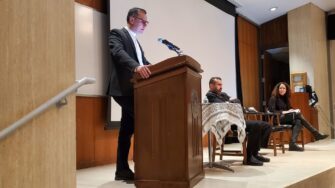
The event emerged from collaborations between Catholic, Lutheran, and Jewish scholars at the University of Notre Dame. Atalia Omer, Co-Director of Contending Modernities, invited the audience to experience these acts of interfaith solidarity not as compassion but rather a more deeply rooted expression of ethical commitments. She closed, “I’m not here personally because of compassion. I’m here because of my ethical outrage and ethical responsibility . . . I have no choice but to show up. I show up for my own situatedness with the responsibility of being Jewish.”
Others echoed Rev. Isaac’s call for solidarity rooted in their faith commitments. ND PhD student Elsa Barron, who attended the lecture, reflected:
Munther Isaac reminded us that by definition, solidarity is a costly endeavor. He encouraged us to act not based on the consequences of solidarity but on our commitment to pursuing justice in all circumstances. As a person of faith, this resonated with me deeply. Following the example of Christ is so clearly a path of sacrifice and persecution, just as it is a walk of great love, joy, and peace. If we say we are followers of this path yet fail to participate in costly solidarity, we need to re-examine our direction.

